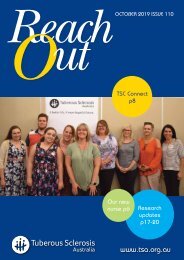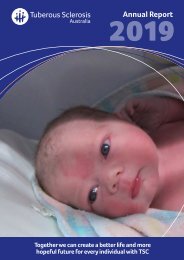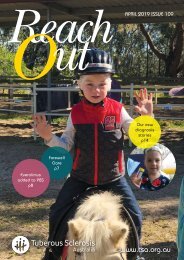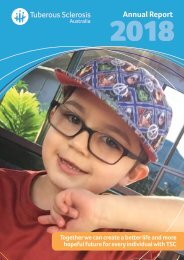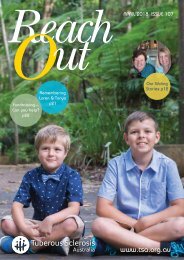Reach Out October 2018
Create successful ePaper yourself
Turn your PDF publications into a flip-book with our unique Google optimized e-Paper software.
TSA News<br />
Editorial<br />
Teresa Llewellyn-Evans<br />
This edition of <strong>Reach</strong> <strong>Out</strong> highlights<br />
transitions. According to the Macquarie<br />
dictionary, transition (noun) is the passage<br />
from one position, state, stage etc. to<br />
another. To transition (verb) is to move<br />
someone in a gradual or planned way<br />
from one role, position or stage of life to<br />
another. Transitions are a normal part<br />
of life and we are each likely to face many<br />
transitions or changes in our life.<br />
I look back at some of my own transitions.<br />
Some of these went smoothly such as when<br />
I married my husband – I found being engaged<br />
was such an in-between time. Others were extremely<br />
challenging and resulted in lots of tears along the way such as<br />
my transition to becoming what I consider to be a good teacher<br />
which I think took about three years! As parents we try to help<br />
our children cope with changes but it can be more daunting if<br />
you are in the midst of your own transition and trying to cope<br />
with your own challenges. This is what it was like when we<br />
moved back to Sydney after living in Tasmania for eight years.<br />
That was a big move for all of us.<br />
I think most of us remember what it was like to be a<br />
teenager and the angst we went through on that journey to<br />
adulthood. But how much more challenging is that transition<br />
for a young person with TSC? Leah shares two transitions in<br />
her life - when she was a teenager wanting to understand who<br />
she was and later when she had medical complications of TSC.<br />
She shares the things that were difficult and the things that<br />
helped. “Something that helped me was understanding where<br />
the TSC lesions were in my brain. When I understood that<br />
these … were stopping those parts of the brain working well<br />
I was less hard on myself for struggling with these skills.” See<br />
Leah’s article on p.14.<br />
Debbie, TSA president, finds “… speaking to others who<br />
have gone through the same thing or reading a personal story<br />
… very helpful, and the advice helps you feel like you are not<br />
the only one going through these challenges.” See Debbie’s<br />
president’s report on p.4. We have two parents who share<br />
stories of their son or daughter’s transition to adulthood.<br />
Selina describes her son Liam’s transition and their<br />
multi-faceted approach to Liam’s health and<br />
wellbeing. “Living away from us has been<br />
the making of Liam.” See Selina’s article<br />
on p.10. Sally shares three periods of<br />
transition for her daughter Amelia - from<br />
primary to secondary school, Years 11 and<br />
12 and transition to post school. Having<br />
the right staff can make all the difference<br />
to how well our children settle into their<br />
new environments and parents need to be<br />
comfortable that their children are getting the<br />
right level of support. See Sally’s article on p.12.<br />
We also have Dr Brittany Hulbert’s article on<br />
Transitioning patients with tuberous sclerosis complex from<br />
paediatric to adult health care. Brittany says that “early,<br />
ongoing and structured preparation is the key to a successful<br />
transition.” See Brittany’s article on p.17.<br />
Debbie also asks us to remember that “transition can be<br />
positive as it may lead to a new opportunity or turn out better<br />
than we thought it would.”<br />
We also have all our regular features. In Celebrations on<br />
p.8 we celebrate what we do for fun. Clare gives us the latest<br />
research on TSC on p.21 - the success of the international<br />
topical rapamycin clinical trial, more on Australian research<br />
into TSC and autism and a study which suggests that mTOR<br />
inhibitor medicines are safe in younger children with TSC.<br />
Kate takes us through a fundraising snapshot of the last<br />
six months on pp.22-23. We’re excited to have launched the<br />
first Australian Comedy for a Cure event with the help of our<br />
dedicated volunteer committee<br />
We thank everyone who has contributed stories or photos<br />
for this edition of <strong>Reach</strong> <strong>Out</strong>, and those who fundraise for the<br />
work of TSA. Your stories and efforts inspire and inform others<br />
who live with TSC, as well as health professionals and the<br />
wider community.<br />
<strong>Reach</strong> <strong>Out</strong> Official Journal of Tuberous Sclerosis<br />
Australia, Inc.<br />
18 Central Rd, Beverly Hills NSW 2209<br />
Telephone: 1300 733 435<br />
Website: www.tsa.org.au<br />
Email: info@tsa.org.au<br />
ABN 20 681 174 734<br />
Incorporation no. Y 07116-42<br />
Registered Charity CC25313<br />
<strong>Reach</strong> <strong>Out</strong> Editor: Teresa Llewellyn-Evans<br />
reachout@tsa.org.au<br />
Disclaimer<br />
The opinions expressed in this journal are those of the<br />
authors and are not official pronouncements of TSA Inc.<br />
Permission<br />
Permission must be sought from the authors or publishers<br />
to reproduce in any way articles or information contained<br />
in this journal. Once permission is received the source must<br />
be acknowledged.<br />
3


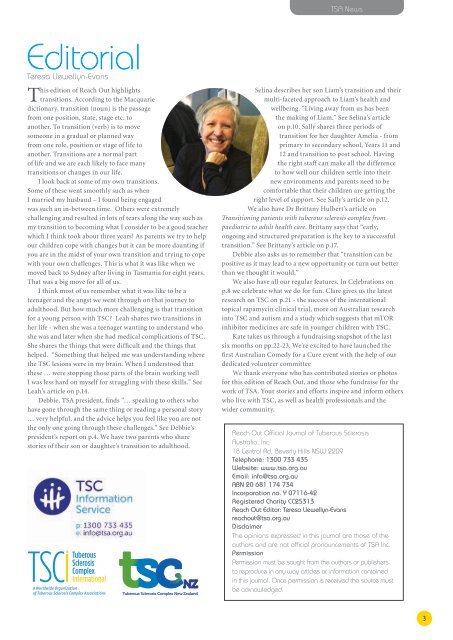


![TSA Reach Out April 2022 [Final]](https://documents.yumpu.com/000/066/687/587/3d369bd665bdb406a759500f62e2cfad0ccb7b3d/47512b4a703265727550565249426664566a727454513d3d/396a524e7354316d3867454b587243526164724c52673d3d.jpg?AWSAccessKeyId=AKIAICNEWSPSEKTJ5M3Q&Expires=1715652000&Signature=q%2B3HQc04a7OtIk7epa7eEMzu3CU%3D)
![TSA AR 2021 [WEB] (1)_FINAL](https://documents.yumpu.com/000/065/886/431/1afb21934ac6c444cd384e5fd7403d62e47080ce/426853747566526573646568546777594b4a4a5734513d3d/547274595943503850786275754544495972536c52513d3d.jpg?AWSAccessKeyId=AKIAICNEWSPSEKTJ5M3Q&Expires=1715652000&Signature=vVr7RqrZgHdCrPp5DEEaldLYze4%3D)

![TSA Reach Out Apr 2021 [WEB]](https://documents.yumpu.com/000/065/442/909/1e583cb2acba0eaa7f1aae53e14a0cf408aa56c4/7871796d694459464d707163324830746459484671673d3d/45356637637a3369494f764f4c3858495549795251513d3d.jpg?AWSAccessKeyId=AKIAICNEWSPSEKTJ5M3Q&Expires=1715652000&Signature=yHttDCug96REl%2FmbEYULpeGpASs%3D)




